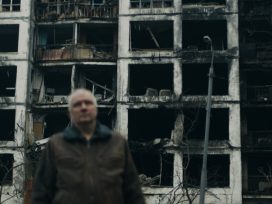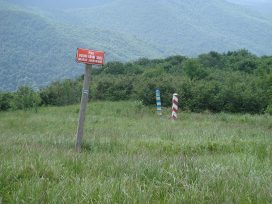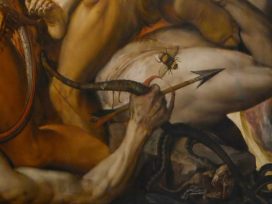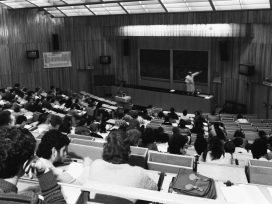Sitting on the floor, contemplating your own death
War diaries from Kyiv, Parhomivka, and on the road to Moldova
As Ukraine repels tanks, missile attacks, invasion and siege, three journalists from the online platform Gwara Media chronicle their impressions, observations and journeys since the start of the war.
On 24th February, we met up in different cities, at different times, in very different frames of mind. All we shared that day was a fear we had never known before, the experience of tremors induced by shots and explosions in the streets, and the fact that none of us knew what would come next.
The Gwara Media office is based in Kharkiv, in an old townhouse overlooking a street that leads into the city’s historic centre. Since launching our platform in 2018, we have been writing about Ukrainian culture and our country’s ‘new reality’ – which to us has meant finding ways of combining tolerance, ethical standards, ecological principles and development goals, that are both innovative and sustainable. We have sought to envisage a future for Ukraine.That morning in February we realized that our new reality, and our future, was war.
Since the first Russian missile struck Ukraine, invading Russian forces have relentlessly bombarded the centre of Kharkiv, its residential areas and architectural monuments. These are acts of barbarism. In the suburbs of Kyiv, private houses and high-rise buildings have been razed to the ground. Mariupol is under siege and in ruins. Volnovakha has been wiped out. We are witnessing a humanitarian catastrophe.
But the Russian onslaught has brought Ukraine and its citizens together as never before. It makes no difference whether you support president Zelensky or oppose him, whether you are born into a Ukrainian-speaking family or a Russian-speaking one. The invasion has shown where the borders of our country, and the boundaries of freedom, really lie.
Olena, editor-in-chief
Olena has remained in Kyiv with her cat and 72-year-old father. She spends her nights either at home or in a bomb shelter.
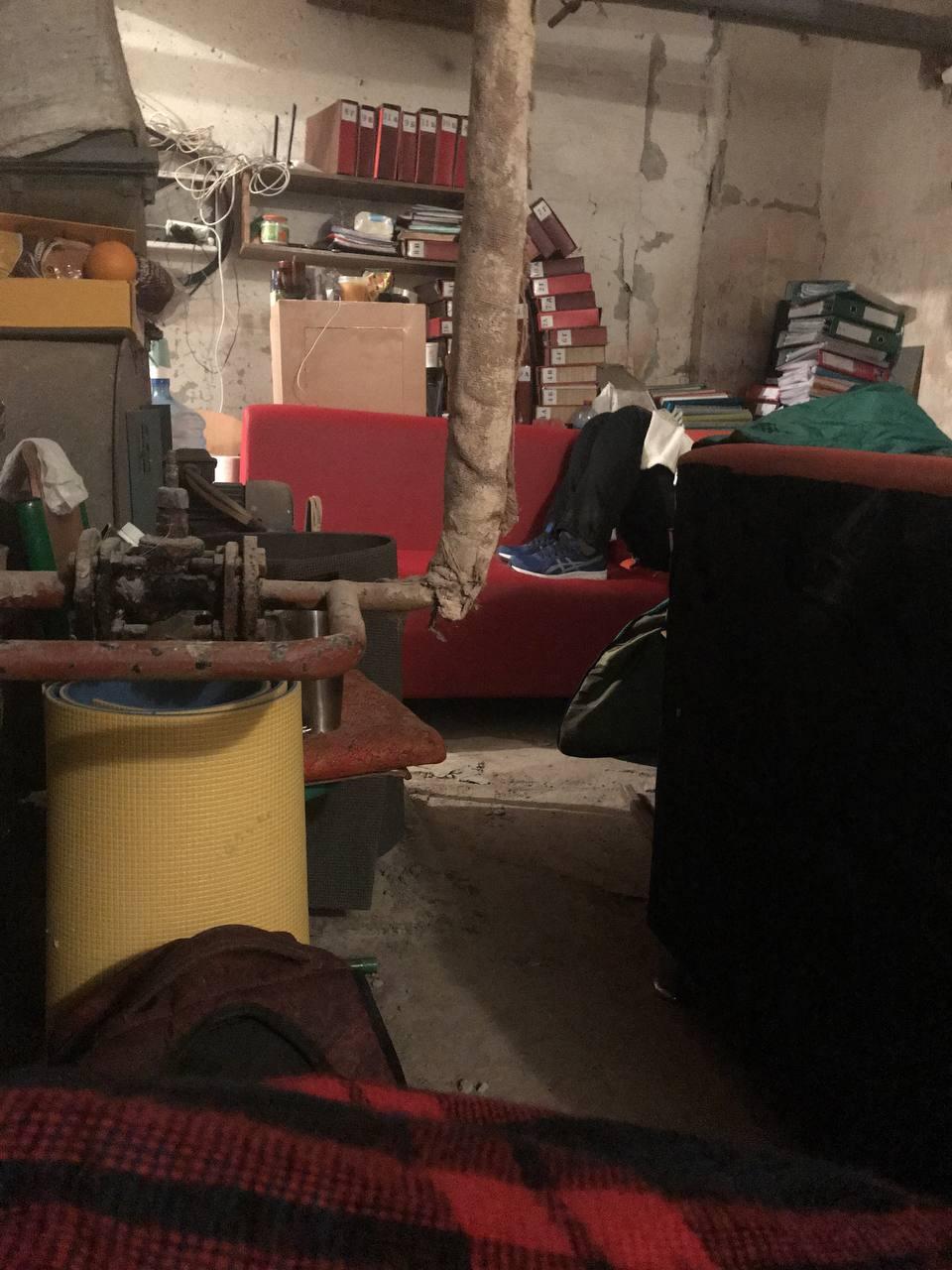
Bomb shelter in a school. Photo courtesy of Gwara Media.
On 24th February I woke up late: it was about 09.00 a.m. The messages on my phone were frantic. The one I saw first came from my mother. It said, quite simply: ‘Russia has attacked’. Feverishly, I scrolled through the news and, within a few minutes, heard the first explosion. It was a new sound to me, like nothing I’d ever heard before. It didn’t compare to noises made by household appliances or to anything heavy tumbling onto the floor. And there was certainly no similarity to fireworks.
I took stock. My father, who suffers from asthma and has a catheter, was at home in Revutsky Street. If he were to run out of medication, and I couldn’t buy more, it would be curtains for him. We were also short of medicine for a go-bag, and there was no knowing if shops or pharmacies would stay open.
I was reminded of the early days of coronavirus lockdown, when people would grab all the bread and toilet paper off the shelves in shops. But now it was far, far worse. I threw a jacket over my pyjamas and set off to the chemist’s. One was closed, another had a queue 100 meters long, and the third was also shut. I duly joined the queue.
The comments and behaviour of people standing in line merit a separate story of their own. Basically, everyone was trying to work out what the different missiles and types of ammunition sound like. As we waited, we heard several explosions from the northern part of the city but, for some reason, one was far louder than the others. Behind me, an elderly lady was on the phone with her son or grandson. She kept saying she had diabetes and enough medication for just two more days. If she didn’t get more, she said, they’d better think about burying her – with Putin or without, she wasn’t bothered.
Before all this, I’d spent a month doing a report on how hard it was to find free health care during the pandemic if you were ill but didn’t have COVID. This was especially true in ‘red zones’, where the risk of infection was considered highest. I didn’t know where I’d place the material when I finished, but my argument was that, although we may know the number of deaths caused by coronavirus, we have very little idea how many people died due to the collapse of the medical system.
The same is true now. Not everyone will be affected by shells or missile strikes but, over time, many will die from other causes, including shortages of medication.
I stood in line for three hours, and lost track of the minutes as they passed. Extreme anxiety seems to break up time. Every minute I was looking over my shoulder to check if things were okay, listening out for what people might be saying. Someone in the queue remarked: ‘If men had any idea how hard it is to give birth, they would never start wars.’
Finally, I managed to buy what I needed and got back home. It’s pretty hard, under these circumstances, to pull yourself together and do anything positive. So I started with something familiar. I wrote a statement on Gwara’s behalf, describing how we would be working from now on. Meanwhile, I reflected on the difference between clip thinking – when you can’t seem to get back on track and deal with big, slow-moving pieces of information – and a catastrophic-constantly-checking-the-news sort of thinking, when your attention is incessantly distracted as it shifts from one piece of news and another.
Gradually more constructive, if still chaotic, thoughts began to take shape in my head. I live with my boyfriend, so we started filling our backpacks and sealing the windows. We made a go-bag for our cat. At this point, I realized I was really worried. The cat hadn’t been vaccinated for rabies. There he was with liver problems, and I hadn’t a clue where to take him or how to take care of him. It was absurd. It almost made me laugh. I was looking into the face of real tyranny: the dictator of a neighbouring country was robbing my cat of his life.
I made the decision to stay in Kyiv almost right away. First, because of my parents. Second, because of Serhii. Third, because of the cat. I don’t know if I’ll ever be able to take him anywhere, but I certainly won’t place him in an animal shelter or let him roam the streets. And, fourth, there was something else: a kind of subtext that carries a huge impact, even though it’s hidden away between the lines. It’s to do with a bizarre inertia and anger, and a sense of the absurdity of it all, an inability to comprehend why you should have to run away and leave your home or your city.
Forced displacement is over the pale. I found myself reflecting on how deeply feelings like this are rooted in the human psyche. We live by them. Human rights are not determined by agreement, they are almost physical laws. In wartime, they put the legal levers diplomats employ to shame.
And I’ll bet that, the morning the invasion began, many people’s minds were filled with thoughts like: ‘War Tanks Attack Damn forgot to wash my hair A missile hit Kyiv Oblast I have to clean my cat’s litter’. Later, in the bomb shelter, a friend told me she forgot to put water in her go-bag, though she’d remembered to grab her cosmetics.
Once we’d taken refuge in the nearest school building, our conditioning and daily routines took over: women, children, elderly people, and men had all brought bags, backpacks, even big travelling suitcases. Once they’d settled down, people took to strolling past the panoramic windows on the first floor, as if a missile was no more than a bus coming round the corner. They imagined it as something you could wait for and, once you’d seen it, run away from.
I don’t know when the first day turned into the second. No one slept. And here’s another weird thing about memory. When you’re stressed, details begin to vanish. I can remember talking to my parents and friends a dozen times over. I even got messages from a few Russians – but it all seemed so far away. Meanwhile, my temperature went up to 38 degrees, perhaps higher. Hard to say if it was because of the three hours queuing with hardly any clothes on, or because I hadn’t had any sleep.
On the second day (not sure if it was still night or closer to morning) Serhii and I went down to the bomb shelter. Today the photos are all over the internet but, when I saw that shelter for the first time, I experienced something very new. For the first few hours, I sat in a chair, without so much as shifting position. A family near us was talking nervously about moving out of the city – not abroad or to the west of the country, just outside Kyiv. Perhaps they thought their house in the country was a safer place to hide, and that it wouldn’t be attacked. They were wrong, of course.
People were coming in with their children and pets, talking, planning something, then taking off again. I watched a mother cry as she complained that her daughter (who was wearing Doc Martins and scrolling through Tiktok) wasn’t upset enough about the war. Hard to say who was more rational. ‘Are we meant to be working today?’ someone asked. ‘If so, they can fire me, but I’m not going in!’ Older people were very quiet.
By now I was exhausted from taking random doses of antipyretics, constantly calling my mum, and scrolling through feed and chats. In fact I hadn’t really done anything. On the third day we slept in what was known as the ‘VIP zone’ of the school’s bomb shelter, reserved for teachers. It was a narrow, damp, cold but quiet place, with pipes that served as ventilation. Teachers from school №234 brought along all their documents and stacks of work. Ira, who was at university with me and now works at the Taras Shevchenko National Museum, had invited us to sleep over here. She described how her team had hurriedly labelled and hidden exhibits as the war started.
That day I felt worse. Perhaps it was the cold and damp – though talking to people genuinely helped. At one point a middle-aged woman said: ‘It’s strange, but when you’re at home, warm and comfortable, you feel the fear. But sitting here in the basement with other people is calming, somehow’.
In the morning, I went back home and spent the day listening to the sound of explosions. Finally, towards evening, I found something useful to do: at the request of Esther Slevogt, I began writing an article aiming to introduce the Ukrainian people to German readers. Later, Serhii and I took turns sleeping. There seemed no alternative.
The worst thing was when one of us was asleep with the other sitting on the floor, on guard, and suddenly there’d be an explosion. Initially, you were paralyzed, and then you learned from the news that a missile had landed somewhere quite far away. Only then did you start to explore the aftertaste, and imagine your own death. No jokes here: you’re sitting on the floor, seriously trying to deal with the knowledge that sooner or later you will die. Even if it isn’t right now, and it’s not a missile that kills you.
I wonder how often older people reflect on this? Do they think about it daily? How can you feel, predict, or prevent your own death? I suspect that people in countries that are generally ‘peaceful’, are simply unaware of this. It isn’t something that can be understood at a distance, or virtually, or by watching horror videos, or by staring at images intended to act as emotional triggers which get downloaded on such a mass scale. In countries where there is peace, people might think that wages, currency exchange rates, living conditions, access to services, art and culture are important. But there comes a point when, sitting on the floor, you see this gradation vanish. Salaries that are bigger or smaller, conditions that are better or worse, degrees of comfort… all these cease to exist. There is only life or death.
Now, sitting on the floor, I recall how, aged 14, I read The Plague by Albert Camus. I was in Crimea at the time. It seems that the more stable and civilized a society is, the more emotionally inert it becomes. And the less inclined it is to believe in the possibility of real catastrophe.
Dasha, social media editor
On the first day of the war, Dasha left Kherson with friends to go to Zakarpattia. She crossed the border, and spent some time in a refugee centre. She is now renting a flat in Moldova.
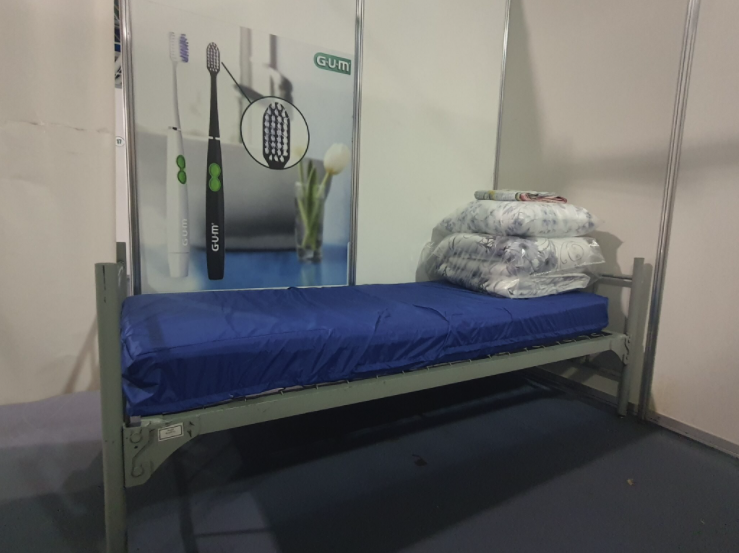
Refugee centre in Moldova. Photo courtesy of Gwara Media.
I wake at 5.00 a.m. for no specific reason. I pick up my phone and see a bunch of new messages in the editorial chat room. It takes me a full day to realize what a crucial effect those messages have had on my life.
Half asleep I unlock my phone and read: ‘Kharkiv bombed’. That is enough. ‘It has started,’ I think. I listen to the silence and hear shots. After that, everything feels like a dream.
I wake my Mum, then write to my boyfriend so he can start collecting our stuff. Within 10 minutes he gets back saying there are massive queues at petrol stations. I start to fill a backpack for Mum, then realize she’s in no hurry at all.
‘I’m not leaving,’ she says. ‘Where am I supposed to go? I can’t leave Gran on her own. If you want to cut and run, that’s OK – just go.’
It’s like being caught in a fog. I carry on packing and think: should I go or shouldn’t I? Earlier, listening to warnings in the news about a probable war, I had suspected this could happen. But I hadn’t wanted to make the choice.
Moments later, I’m dressed, standing in the corridor, kissing my mother goodbye. She crosses me, as she always does before I leave home. ‘God be with you,’ she says. I hug her. ‘I love you, Mum,’ I say. ‘See you.’
It’s like being in a movie.
Minutes later, we are on our way to our friends’ house. Kherson’s streets are in chaos. People don’t care about road safety rules anymore. There are huge lines of cars outside petrol stations. Amazingly, although some people are leaving town with their belongings, others are calmly waiting for a bus to take them in to work.
Once we are outside the city, we relax a little.
Fortunately, there isn’t too much traffic on the road, but you can feel the tension in the air. Obviously, being on the road a couple of hours after you’ve heard explosions is far from safe. I realize that anything could happen. On the way, I scan the news from the cities we will be travelling through.
‘Shots heard in Mykolaiv’, a friend writes.
It makes no sense to turn back, and panic could have a dangerous effect on everyone. At our own risk, and as calmly as we can, we cross the port city of Mykolaiv.
The journey seems more difficult because none of us has slept. We drive into the countryside and lie down to take a rest. The driver and my boyfriend fall asleep, while I look up into the sky and anxiously eye every passing car. Who knows what these people might be up to, and who they are?
Suddenly, we realize we have no idea what to do. We had thought that, in a couple of days, we’d be back home. Now we are travelling in the direction of the mountains, where things should be calmer. The further away from Kherson Oblast we go, the easier it is to breathe. But the apprehension remains. My throat is dry, my body shakes and my heart is beating so hard it really does feel like it’s about to leap out of my chest. Now I understand what that expression actually means.
We take a longer break and get some sleep. After that, we make a firm decision. We’ll head for the Carpathians, stay a couple of days and then, if everything’s alright, we’ll go home.
The road is hard. We sleep for an hour at a time in petrol stations. We drive through the countryside. Periodically we join other cars in queues of traffic and, for some reason, feel reassured.
The gas stations are crowded. Petrol is being sold in limited quantities, and people buy it all. At one station the cashier seems visibly nervous, but continues doing his job. As we travel west, we pick up the news that Russian tanks have gathered in the suburbs of our home town, Kherson, and that the first battles have begun.
Oleksii, videographer
With his family, Oleksii has moved to the village of Parhomivka, best known for a museum that exhibits some remarkable artworks including paintings by Kazimir Malevich.
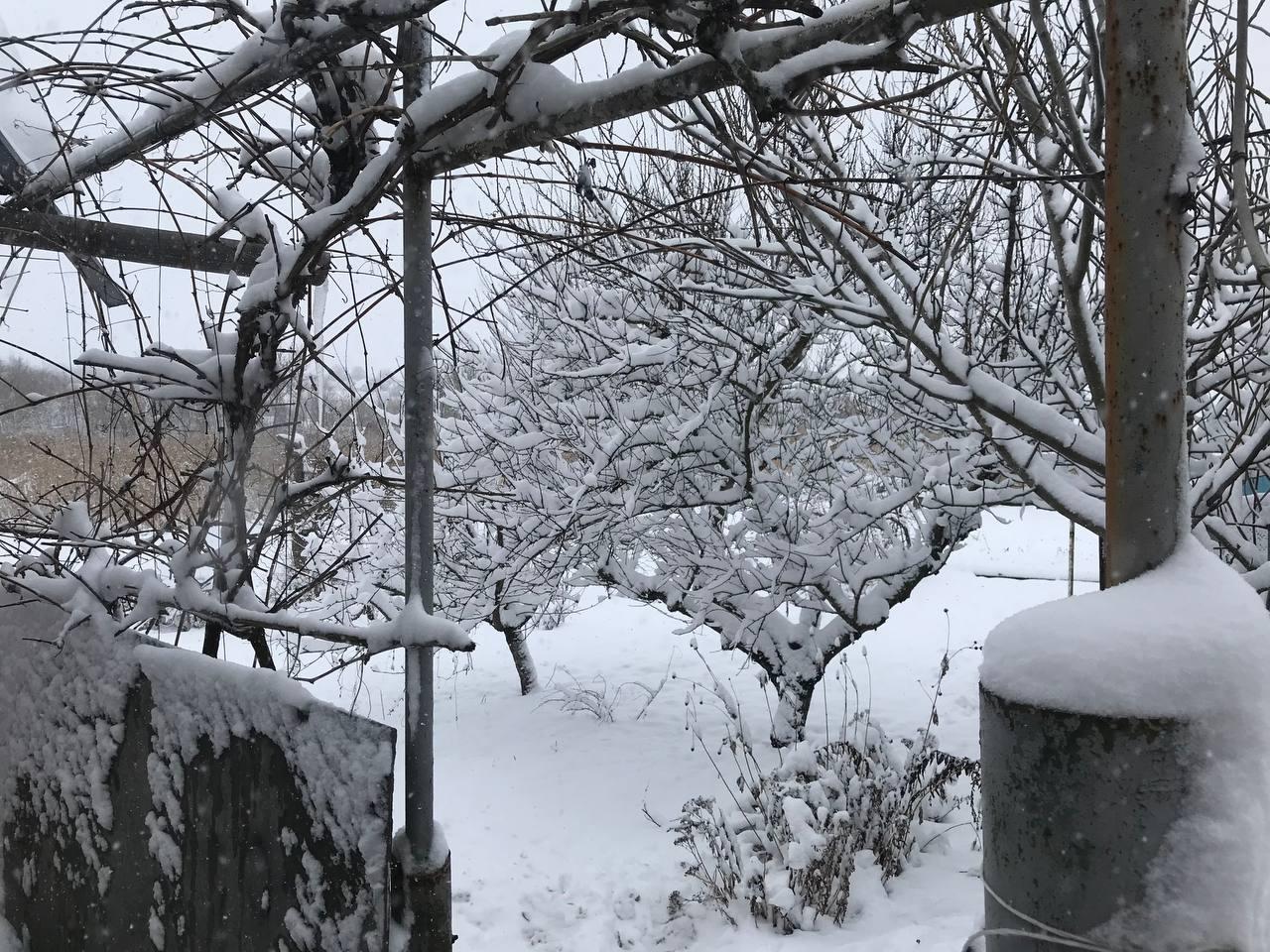
Winter scene in the village of Parhomivka. Photo courtesy of Gwara Media.
I am woken by explosions and understand what to do right away. But everything seems unreal: I have stepped into a nightmare.
My head is spinning. I remember excerpts from Putin’s speech, his denial of my country’s right to exist. My mind is filled with images of my past existence, my once tranquil life, as I try to process the realization that it can never return.
The first hours of the war are the hardest – there’s no information, no sense of what to expect. All around people are in a state of panic.
Our family leaves the city. I don’t let go of my camera, even for a moment: it both distracts me and keeps my thoughts focused. We arrive in the village, set about arranging things in the house and try to adjust to our new circumstances. We monitor the news constantly. The tension is palpable.
As time passes, we get accustomed to the sound of military vehicles. We stop running down to the basement every time we hear an explosion. In fact, we decide not to go down there at all. It’s not that much safer anyway.
I am overwhelmed by a desire to return to Kharkiv. It’s very hard to stand aside and be inactive when the history of your country is being re-written. I do my best to work, fighting my battle for Ukraine on the information front.
I believe in victory.
Gwara Media, based in Kharkiv, creates digital content on the cultural and creative industries in Ukraine. It also records audiobooks, makes video products, and acts as an online hub for artists and programmers. Most recently, the Gwara team created a ‘bot’, named PEREVIRKA, which verifies facts and checks the reliability of links and texts. A team of volunteers, professional journalists and fact-checkers work alongside the bot, to help identify sources for information published on the web. In the first week of war alone, enquiries from our readers ran into thousands. Doubt the news? Just use the bot!
Published 24 March 2022
Original in English
First published by Gwara Media (in Ukrainian)
Contributed by Gwara Media © Gwara Media / Eurozine
PDF/PRINTPublished in
In collaboration with
In focal points
Newsletter
Subscribe to know what’s worth thinking about.
Related Articles
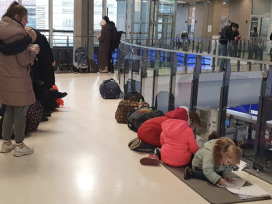
'It’s important to be open'
A Knowledgeable Youth podcast
Remaining in a new country or returning home? The Knowledgeable Youth podcast delves into the complex decision-making refugees face when migrating, together with researcher Olena Yermakova.
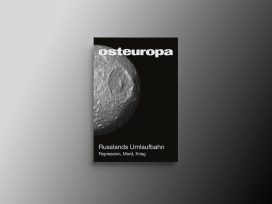
Russia’s orbit
Osteuropa 4/2024
Repression, murder, war: on the logic driving the Putin regime toward ever-greater excesses of violence. Featuring Yuri Andrukhovych on the Russian colonial empire – the only ever to have tried to reconquer a former possession. Also: articles on Navalny, and on what next for Georgia?

